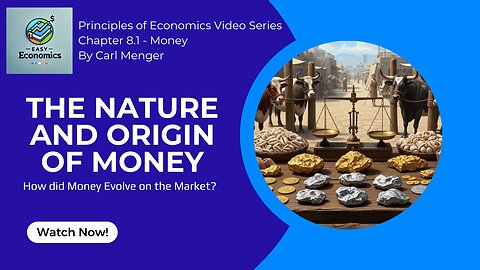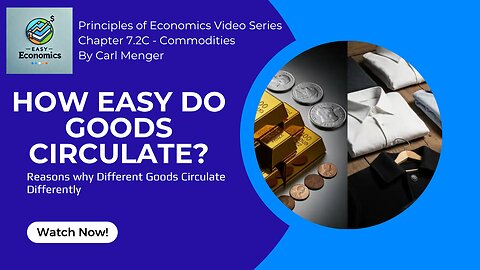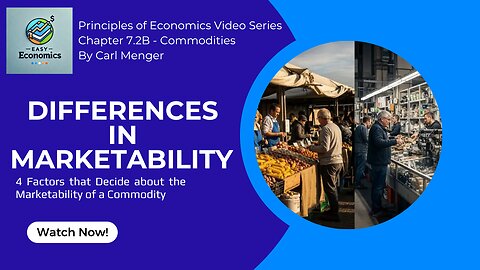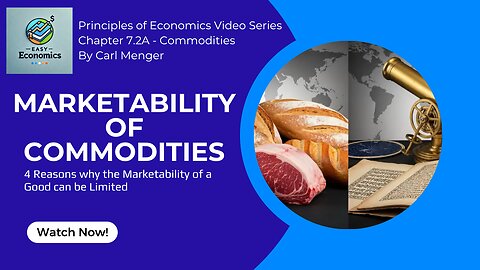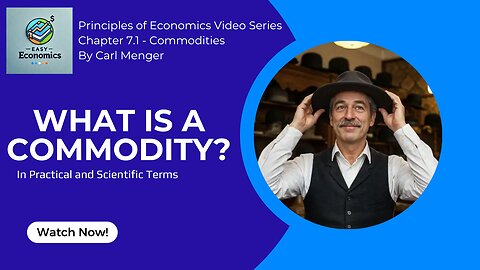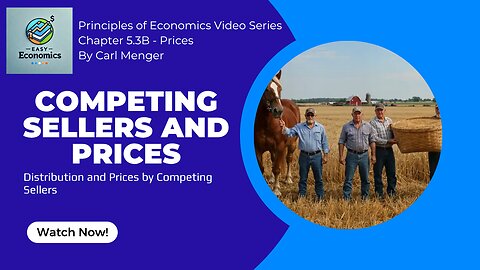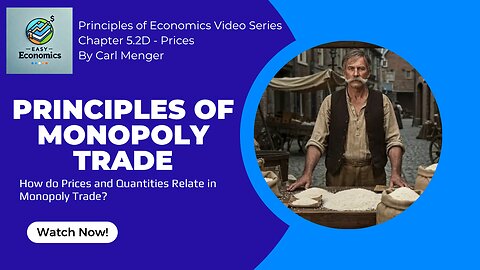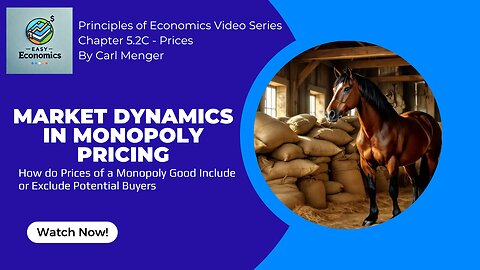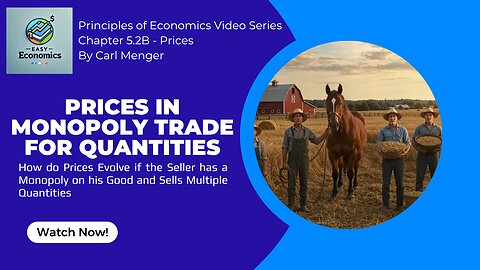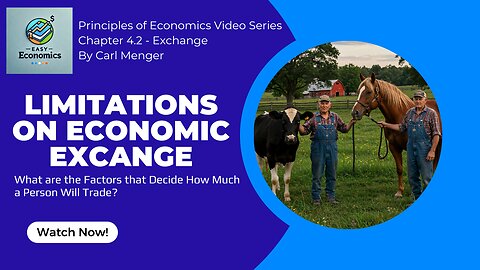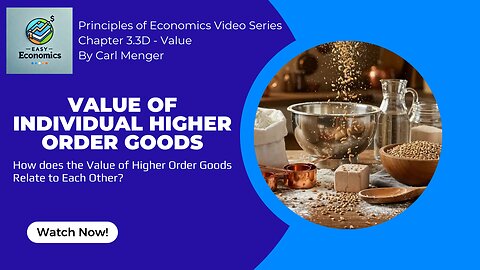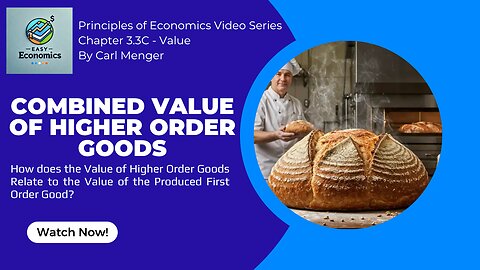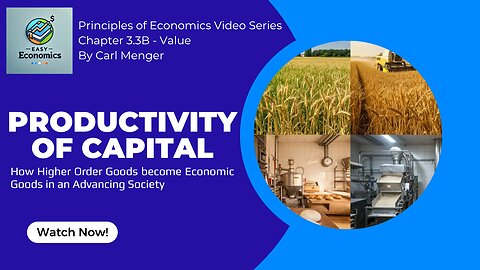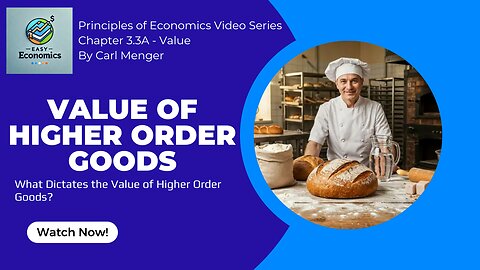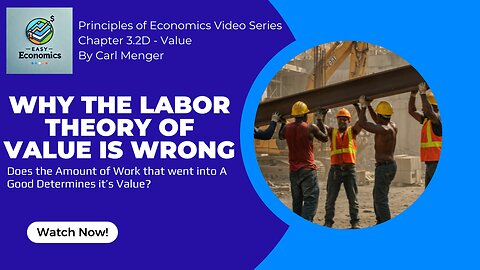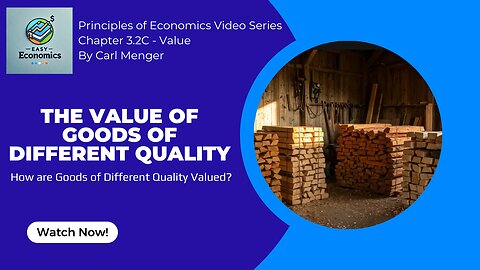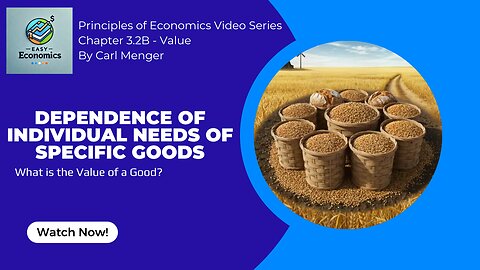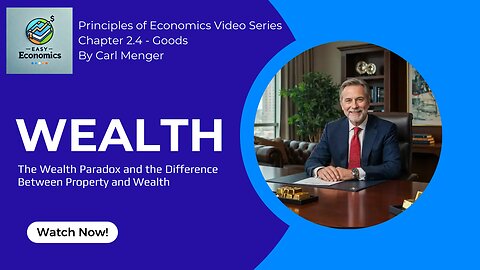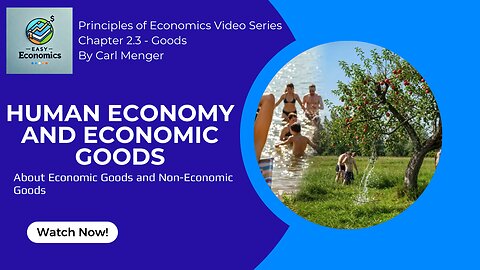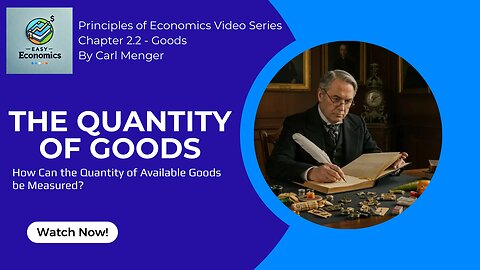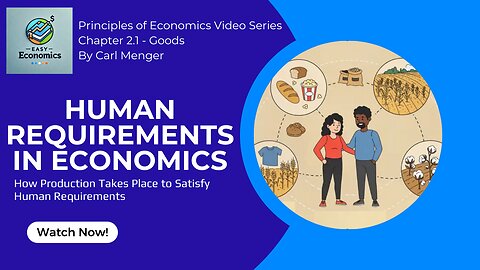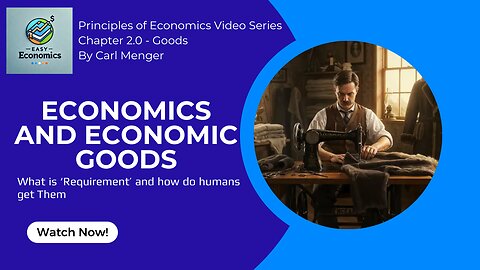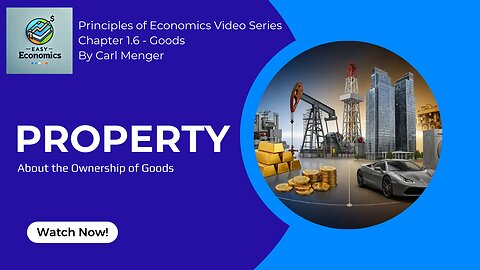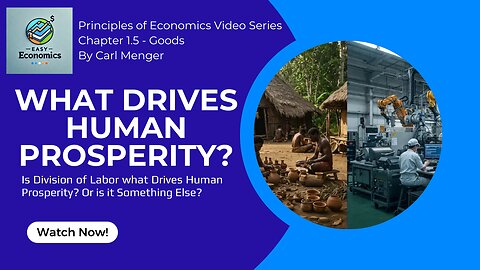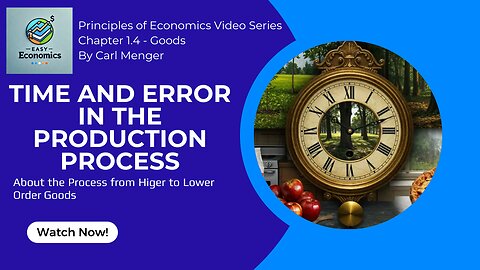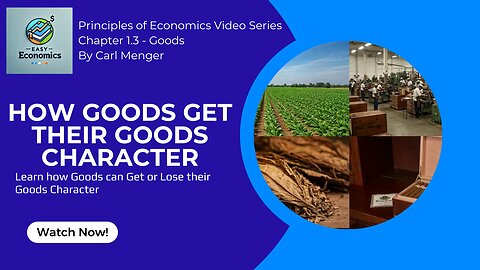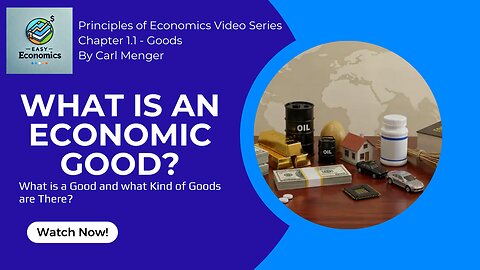Premium Only Content
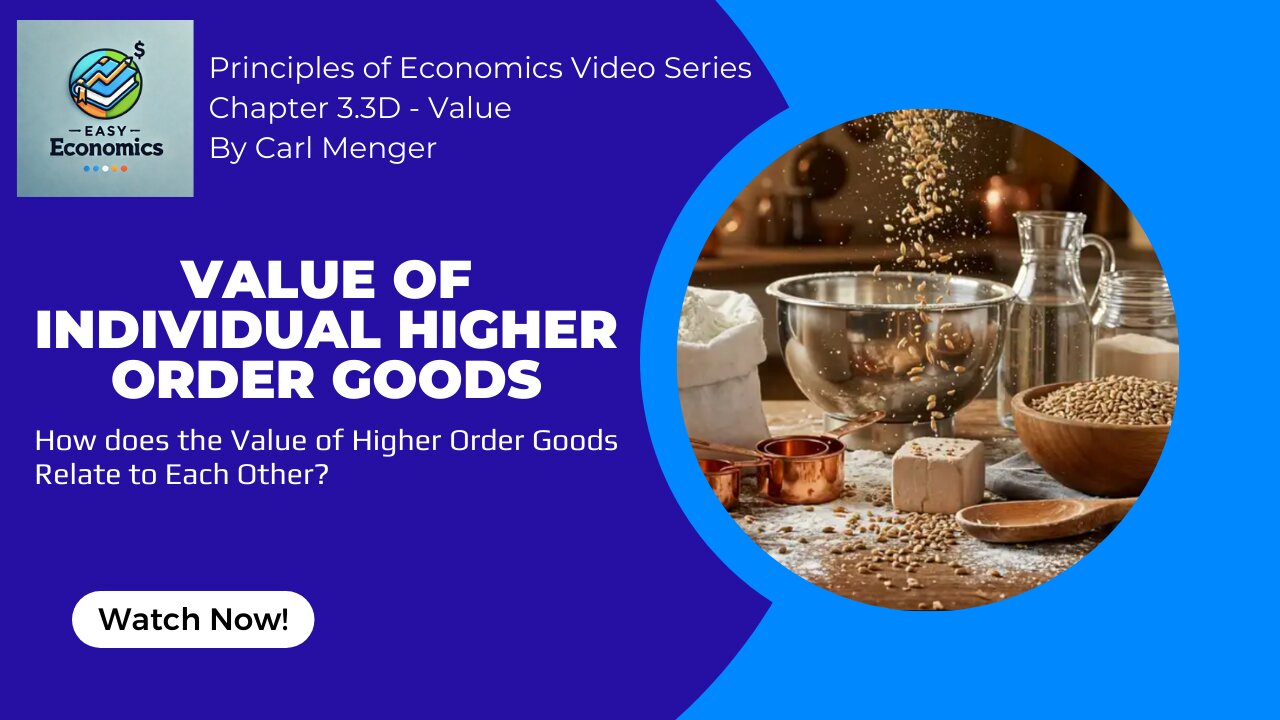
Principles of Economics by Carl Menger Chapter 8.1 - The Nature and Origin of Money
Principles of Economics by Carl Menger Chapter 7.2C - Circulability of Commodities
Principles of Economics by Carl Menger Chapter 7.2B - Differences in Marketability of Commodities
Principles of Economics by Carl Menger Chapter 7.2A - Marketability of Commodities
Principles of Economics by Carl Menger Chapter 7.1 - What is a Commodity?
Principles of Economics by Carl Menger Chapter 5.3C - Competition Policy
Principles of Economics by Carl Menger Chapter 5.3B - Price Formation by Competing Sellers
Principles of Economics by Carl Menger Chapter 5.3A - Price Forming and Distribution by Competition
Principles of Economics by Carl Menger Chapter 5.2D - Principles of Monopoly Trade
Principles of Economics by Carl Menger Chapter 5.2C - Market Dynamics of Monopoly Pricing
Principles of Economics by Carl Menger Chapter 5.2B - Price Forming in Monopoly Trade for Quantities
Principles of Economics by Carl Menger Chapter 5.2A - Price Formation in Monopoly Trade
Principles of Economics by Carl Menger Chapter 5.1 - Price Formation in Isolated Exchange
Principles of Economics by Carl Menger Chapter 5.0 - The Theory of Price
Principles of Economics by Carl Menger Chapter 4.2 - The Limits of Economic Exchange
Principles of Economics by Carl Menger Chapter 4.1 - Foundations of Economic Exchange
Principles of Economics by Carl Menger Chapter 3.3E - The Value of Land, Labour and Capital
Principles of Economics by Carl Menger Chapter 3.3D - The Value of Individual Higher Order Goods
Principles of Economics by Carl Menger Chapter 3.3C - Combined Value of Higher Order Goods
Principles of Economics by Carl Menger Chapter 3.3B - The Productivity of Capital
Principles of Economics by Carl Menger Chapter 3.3A - What Causes the Value of Higher Order Goods?
Principles of Economics by Carl Menger Chapter 3.2D - The Subjective Nature of the Measure of Value
Principles of Economics by Carl Menger Chapter 3.2C - Influence of the Quality of Goods on Value
Principles of Economics by Carl Menger Chapter 3 2B - The Value of Goods for Individual Needs
Principles of Economics by Carl Menger Chapter 3.2A - Difference in Importance for Individual Needs
Principles of Economics by Carl Menger Chapter 3.1 - The Theory of Value
Principles of Economics by Carl Menger Chapter 2.4 - What is Wealth?
Principles of Economics by Carl Menger Chapter 2.3 - Human Economy and Economic Goods
Principles of Economics by Carl Menger Chapter 2.2 - Available Quantities of Goods
Principles of Economics by Carl Menger Chapter 2.1 - Human Requirements in Economics
Principles of Economics by Carl Menger Chapter 2.0 - Economy and Economic Goods
Principles of Economics by Carl Menger Chapter 1.6 - Ownership of Goods
Principles of Economics by Carl Menger Chapter 1.5 - Causes of Human Prosperity
Principles of Economics by Carl Menger Chapter 1.4 -Time and Error in the Production Process
Principles of Economics by Carl Menger Chapter 1.3 - The Laws that Govern Goods Character
Principles of Economics by Carl Menger Chapter 1.2 - The Causal Connection Between Goods
Principles of Economics by Carl Menger Chapter 1.1 - The Nature of Goods
Principles of Economics by Carl Menger Chapter 3.3D - The Value of Individual Higher Order Goods
You want to read the book? Get it here: https://amzn.to/4cCPIQs
Watch the next video in this series: https://rumble.com/v6tnufv-principles-of-economics-by-carl-menger-chapter-3.3e-the-value-of-land-labou.html
Watch the video series from the start: https://rumble.com/playlists/I48mBTB4w2c
Watch our video about Carl Menger: https://rumble.com/v61z0l2-carl-menger-the-father-of-austrian-economics-and-subjective-value.html
Can a single input in production be worthless without the rest? Not at all—according to Carl Menger’s insight in Principles of Economics, Section 3.3D. In this video, we break down how individual higher-order goods—like tools, labor, or raw materials—each have their own value, even though they must be combined with other goods to produce final products.
Menger explains that production processes are flexible, not rigid formulas. You can often substitute more of one input (like land or labor) for another (like fertilizer), without losing the entire product. This means that each input’s value doesn’t depend on the whole set—it depends on how much worse off we’d be without it.
If removing an input results in lower quality or smaller output, that input’s value is measured by the difference between the needs we can satisfy with it and without it. Even when one missing input means you can’t make the original product, the other inputs still retain value—they can be used for other, less satisfying outcomes.
This leads to a key principle: The value of a single higher-order good equals the difference in the importance of needs satisfied with it versus without it, assuming we use everything else efficiently.
This is marginal value in action, applied to the building blocks of production. If you want to understand how real-world producers assess value in complex production chains, this video is essential.
❓ Questions Answered in This Video
-Do individual production inputs have value on their own?
-How flexible are production processes in using different inputs?
-What happens when one input is missing?
-How do we measure the value of a single higher-order good?
-Why doesn’t a missing input destroy the value of the others?
-What is the marginal value of production inputs?
-Can inputs be replaced or substituted in production?
-How does quality loss affect the value of a missing input?
-Why are production inputs valued differently based on context?
-How do entrepreneurs decide how much an input is worth?
00:00 - Introduction to the Value That Individual Higher-Order Goods Have for Us
00:14 - The Value of Higher-Order Goods
00:35 - The Role of Complementary Goods
00:55 - Flexibility in Production
01:20 - Adjusting Inputs in Production
01:33 - The Impact of Input Reduction
01:54 - Alternative Uses of Inputs
02:10 - Determining the Value of Higher-Order Goods
02:35 - Retaining Value Through Alternative Uses
02:56 - The General Rule Defined
03:16 - The Broader Law of Value
03:31 - Factors Affecting the Value of Higher-Order Goods
04:01 - Outro
#MarginalValue #ProductionInputs #AustrianEconomics
-
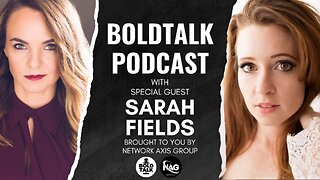 59:03
59:03
NAG Podcast
9 hours agoSarah Fields: BOLDTALK W/Angela Belcamino
39.4K9 -
 1:21:41
1:21:41
Glenn Greenwald
12 hours agoGlenn Takes Your Questions: On the Argentina Bailout, Money in Politics, and More; Plus: Journalist Jasper Nathaniel on Brutality and Settler Attacks in the West Bank | SYSTEM UPDATE #541
92K47 -
 3:10:08
3:10:08
Barry Cunningham
9 hours agoPRESIDENT TRUMP TO USE NUCLEAR OPTION? FOOD STAMPS END! | SHUTDOWN DAY 31
55.6K45 -
 1:06:56
1:06:56
BonginoReport
17 hours agoThe Battle Between Good & Evil w/ Demonologist Rick Hansen - Hayley Caronia (Ep.168)
105K39 -
 1:12:57
1:12:57
Kim Iversen
11 hours agoBill Gates Suddenly Says “Don’t Worry About Climate Change”?
94.1K68 -
 1:05:12
1:05:12
Michael Franzese
11 hours agoI Waited 50 Years to Tell You What Happened on Halloween 1975
47.6K20 -
 1:07:15
1:07:15
Candace Show Podcast
12 hours agoINFILTRATION: Charlie Kirk Was Being Tracked For Years. | Candace Ep 256
97.6K416 -
 9:17:19
9:17:19
Rallied
11 hours ago $4.26 earnedWarzone Solo Challenges then RedSec Domination
44K8 -
 2:34:30
2:34:30
Red Pill News
13 hours agoBoomerang Time - DOJ Investigating BLM Fraud on Red Pill News Live
75.5K18 -
 1:46:14
1:46:14
Roseanne Barr
13 hours ago“The Over Emotional Are Always Under Informed” | The Roseanne Barr Podcast #121
98.7K67
